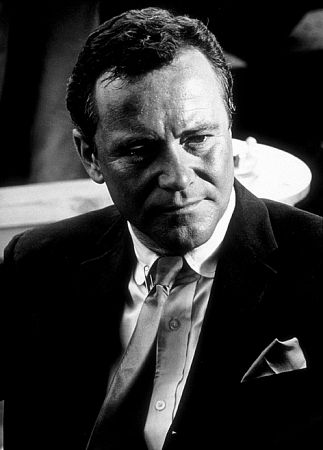|
Jack Lemmon
Scroll down for movie list.
Biography from Leonard Maltin's Movie Encyclopedia:
This actor makes what he does look easy; perhaps that's why he's sometimes taken for granted. Look again, and you see forty years of stardom, an unusually high degree of quality films, a daunting range of parts, and (especially in recent years) a bent for the challenging and unpredictable. The Harvard-educated actor demonstrated his ability early on, more than holding his own among Henry Fonda, James Cagney, and William Powell in Mister Roberts (1955), and even winning a Best Supporting Actor Oscar for his comic turn as the scheming Ensign Pulver. He was nominated for his leading roles in two Billy Wilder classics, Some Like It Hot (1959, in drag with Tony Curtis) and The Apartment (1960, as a sniveling toadie to amoral executives), and again for his harrowing turn as an alcoholic in Days of Wine and Roses (1962) for Blake Edwards.
The essential Lemmon, however, is the hapless victim of fate, constantly victimized by life's vicissitudes through no fault of his own. He most skillfully delineated that comic persona in his vehicles of the 1960s and early 1970s, and was felicitously teamed with hangdog-faced Walter Matthau in several of those films, most notably The Fortune Cookie (1966, another Billy Wilder gem) and The Odd Couple (1968, from the pen of playwright Neil Simon). He continued to work with Wilder, in a too-little-seen midlife crisis comedy, Avanti! (1972), as Hildy Johnson (opposite Matthau as Walter Burns) in the 1974 remake of The Front Page and with Matthau again in Buddy, Buddy (1981). Matthau and Lemmon reteamed in 1993 for the surprise hit Grumpy Old Men (as feuding neighbors).
In 1973, however, he won an Oscar for a dramatic role, as a beleagured dress manufacturer in Save the Tiger and in recent years some of his finest work has flown in the face of his lighthearted image. He was Oscar-nominated for The China Syndrome (1979, as a nuclear plant executive who refuses to participate in an accident coverup), Tribute (1980, recreating his Broadway performance as a dying playwright who wants to reconcile with his son), and Missing (1982, as an American businessman searching for his activist son in a Latin American country).
At a time when other actors might play it safe, Lemmon, in his 50s and 60s, took more risks than ever-and also took his time between films, waiting for good scripts instead of settling for junk. He headlined an impressive Broadway production of Eugene O'Neill's Long Day's Journey Into Night (which was later telecast), took an intriguing cameo part in Oliver Stone's JFK (1991), and got some of the best reviews of his career for a powerhouse performance in Glengarry Glen Ross (1992). He made a fleeting appearance in Robert Altman's The Player (1992, playing the piano) and then contributed a poignant vignette to Altman's Short Cuts (1993) as Bruce Davison's long-estranged father.
Lemmon directed his friend Matthau in Kotch (1971), his only fling behind the camera. In Blake Edwards' That's Life! (1986) he appeared on screen with his actress wife, Felicia Farr (who played a fortune teller) and his actor son, Chris Lemmon (who played ... his son). Lemmon received the American Film Institute Life Achievement Award in 1988, but, as a lifelong pianist (and a good one), one of his most satisfying achievements was contributing a song to his 1957 movie Fire Down Below.
|  |










